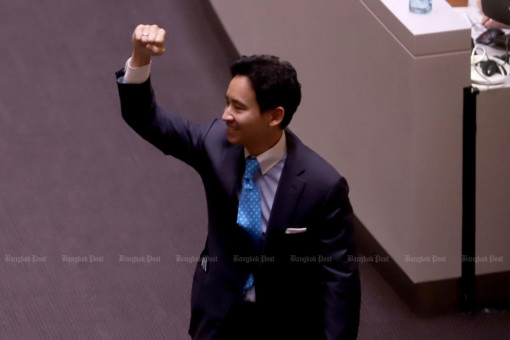Nixing renomination ‘unconstitutional’

Legal experts are questioning whether a parliamentary resolution rejecting the renomination of Move Forward Party (MFP) leader Pita Limjaroenrat for prime minister was constitutional, suggesting the issue should be taken to the Constitutional Court for a ruling.
Borwornsak Uwanno, former chair of a constitution drafting committee, on Thursday slammed the resolution on Facebook, saying the Constitutional Court should look into the issue.
“Invoking a parliamentary session regulation has crippled the constitution despite the fact the charter specifically covers the prime ministerial election,” he wrote. “It’s a pity for Thailand.”
He said he was disappointed with MPs who voted against Mr Pita’s renomination.
He noted that the parliament’s interpretation was not final. Anyone who thought their rights were affected over this matter could petition the Ombudsman to determine whether the parliamentary resolution was a breach of Section 213 of the constitution, he said, apparently referring to Mr Pita.
The petition can be submitted to the Ombudsman, who will submit the petition to the Constitutional Court, Mr Borwornsak said, adding the affected person can also directly petition the court if the Ombudsman doesn’t.
“I will wait and see if parliament’s action violated the constitution,” he said. “I will see how the Constitutional Court will rule on this.”

Invoking a parliamentary session regulation has crippled the constitution despite the fact that the charter specifically covers the prime ministerial election, says Borwornsak Uwanno, former chair of a constitution drafting committee.
His comments came after a majority of MPs and senators voted on Wednesday to reject Mr Pita’s renomination on the grounds that parliamentary meeting regulation No.41 prohibited the resubmission of a failed motion during the same parliamentary session unless new circumstances were factored in.
They argued that an earlier motion regarding Mr Pita’s nomination was already rejected by parliament on July 13, when he failed to get the needed majority of votes in the first round.
Jade Donavanik, legal scholar and ex-adviser to a charter drafting panel, said that he believed Mr Pita’s nomination on July 13 was not a motion, so the regulation should not have been applied.
“The nomination of a prime minister candidate was not a motion. But the debate in parliament was off point,” Mr Jade said.
Khomsan Phokhong, law lecturer at Sukhothai Thammathirat Open University, pointed out that Regulation No.41 could be waived only if a new factor was introduced. For example, Mr Pita could be renominated for the prime minister post for the next round of a vote on Thursday if other candidates were also nominated alongside him.
“This means the circumstances are different, and the parliament president can decide to permit Mr Pita’s renomination,” Mr Khomsan said.

The nomination of a prime minister candidate was not a motion. But the debate in parliament was off point, says Jade Donavanik, a legal scholar.
In response to Mr Borwornsak, Sen Seree Suwanpanont, a former constitution drafter, said that hundreds of MPs and senators agreed that Mr Pita’s renomination was not permitted under the parliamentary meeting regulation and thus they voted against Mr Pita’s second bid.
“The MFP can renominate Mr Pita for a new round of voting as it wishes, but we will stand by the same principle,” Sen Seree said. “The party has the right to petition the Ombudsman or the Constitutional Court.”
Meanwhile, MFP secretary-general Chaithawat Tulathon said on Thursday that he met key Pheu Thai figures for talks on how to proceed with the formation of a new government.
“We are trying to ensure that a government comprising the eight coalition partners is formed successfully,” he said.
Asked what the MFP would do if Pheu Thai nominated its candidate, Srettha Thavisin, for the next round of a PM vote, he said the matter would be discussed at a meeting of MPs and executives of the MFP.
Asked about Mr Srettha’s comments that Pheu Thai will oppose any change to Section 112 of the Criminal Code, Mr Chaithawat only said that there was no discussion with Pheu Thai yet.
“The eight coalition allies will meet for talks in the next few days and things will become clear,” he said.

This means the circumstances are different and the parliament president can decide to permit Mr Pita’s renomination, says Khomsan Phokhong, a law lecturer.

